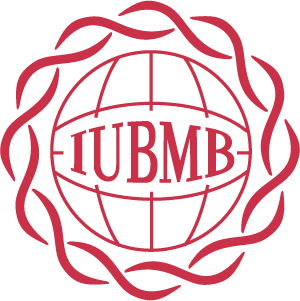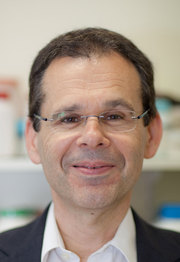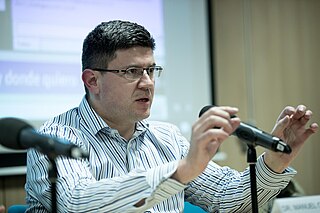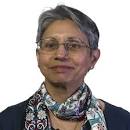
In biochemistry, a transferase is any one of a class of enzymes that catalyse the transfer of specific functional groups from one molecule to another. They are involved in hundreds of different biochemical pathways throughout biology, and are integral to some of life's most important processes.
The Institute of Biochemistry and Biophysics(IBB) is a pioneering Iranian research institute founded in 1976 to conduct world class research in cellular and molecular biology. It is affiliated with University of Tehran and is located in the university campus.

The International Union of Biochemistry and Molecular Biology (IUBMB) is an international non-governmental organisation concerned with biochemistry and molecular biology. Formed in 1955 as the International Union of Biochemistry (IUB), the union has presently 79 member countries and regions. The Union is devoted to promoting research and education in biochemistry and molecular biology throughout the world, and gives particular attention to localities where the subject is still in its early development.

The Chemistry Development Kit (CDK) is computer software, a library in the programming language Java, for chemoinformatics and bioinformatics. It is available for Windows, Linux, Unix, and macOS. It is free and open-source software distributed under the GNU Lesser General Public License (LGPL) 2.0.

Robert David Stevens is a professor of bio-health informatics. and former Head of Department of Computer Science at The University of Manchester

UTOPIA is a suite of free tools for visualising and analysing bioinformatics data. Based on an ontology-driven data model, it contains applications for viewing and aligning protein sequences, rendering complex molecular structures in 3D, and for finding and using resources such as web services and data objects. There are two major components, the protein analysis suite and UTOPIA documents.

Intelligent Systems for Molecular Biology (ISMB) is an annual academic conference on the subjects of bioinformatics and computational biology organised by the International Society for Computational Biology (ISCB). The principal focus of the conference is on the development and application of advanced computational methods for biological problems. The conference has been held every year since 1993 and has grown to become one of the largest and most prestigious meetings in these fields, hosting over 2,000 delegates in 2004. From the first meeting, ISMB has been held in locations worldwide; since 2007, meetings have been located in Europe and North America in alternating years. Since 2004, European meetings have been held jointly with the European Conference on Computational Biology (ECCB).
Jack Y. Yang is an American computer scientist and biophysicist. As of 2011, he is the editor-in-chief of the International Journal of Computational Biology and Drug Design.

Lawrence E. Hunter is a Professor and Director of the Center for Computational Pharmacology and of the Computational Bioscience Program at the University of Colorado School of Medicine and Professor of Computer Science at the University of Colorado Boulder. He is an internationally known scholar, focused on computational biology, knowledge-driven extraction of information from the primary biomedical literature, the semantic integration of knowledge resources in molecular biology, and the use of knowledge in the analysis of high-throughput data, as well as for his foundational work in computational biology, which led to the genesis of the major professional organization in the field and two international conferences.

Gene Designer is a computer software package for bioinformatics. It is used by molecular biologists from academia, government, and the pharmaceutical, chemical, agricultural, and biotechnology industries to design, clone, and validate genetic sequences. It is proprietary software, released as freeware needing registration.

The International Society for Computational Biology Student Council (ISCB-SC) is a dedicated section of the International Society for Computational Biology created in 2004. It is composed by students from all levels in the fields of bioinformatics and computational biology. The organisation promotes the development of the students' community worldwide by organizing different events including symposia, workshops, webinars, internship coordination and hackathons. A special focus is made on the development of soft skills in order to develop potential in bioinformatics and computational biology students around the world.

The European Conference on Computational Biology (ECCB) is a scientific meeting on the subjects of bioinformatics and computational biology. It covers a wide spectrum of disciplines, including bioinformatics, computational biology, genomics, computational structural biology, and systems biology. ECCB is organized annually in different European cities. Since 2007, the conference has been held jointly with Intelligent Systems for Molecular Biology (ISMB) every second year. The conference also hosts the European ISCB Student Council Symposium. The proceedings of the conference are published by the journal Bioinformatics.
Translational bioinformatics (TBI) is a field that emerged in the 2010s to study health informatics, focused on the convergence of molecular bioinformatics, biostatistics, statistical genetics and clinical informatics. Its focus is on applying informatics methodology to the increasing amount of biomedical and genomic data to formulate knowledge and medical tools, which can be utilized by scientists, clinicians, and patients. Furthermore, it involves applying biomedical research to improve human health through the use of computer-based information system. TBI employs data mining and analyzing biomedical informatics in order to generate clinical knowledge for application. Clinical knowledge includes finding similarities in patient populations, interpreting biological information to suggest therapy treatments and predict health outcomes.

Ilham Shahmuradov is the Azerbaijan National Academy of Sciences Head of Bioinformatics laboratory in ANAS Botany Institute, professor of Department of Medical Biology and Genetics in the Azerbaijan Medical University, doctor of biological sciences, Curator of the Bioinformatics courses in the Departments of Biology, Ecology and Solil Sciences, Baku State University, corresponding member of Azerbaijan National Academy of Sciences

Anthony Steven Weiss AM PhD FRSC FTSE FRSN FRACI, FTERM, FBSE is a university researcher, company founder and entrepreneur. He is the leading scientist in human tropoelastin research and synthetic human elastin. He holds the McCaughey Chair in Biochemistry, heads the Charles Perkins Centre Node in Tissue Engineering and Regenerative Medicine, and is Professor of Biochemistry and Molecular Biotechnology at the University of Sydney. His discoveries are on human elastic materials that accelerate the healing and repair of arteries, skin and 3D human tissue components. He is a Fellow of the Royal Society of Chemistry. Weiss is on the editorial boards of the American Chemical Society Biomaterials Science and Engineering, Applied Materials Today (Elsevier), Biomaterials, Biomedical Materials, BioNanoScience (Springer) and Tissue Engineering. He is a biotechnology company founder, promoter of national and international technology development, and has received national and international awards, including the Order of Australia.
Narayanaswamy Srinivasan was an Indian molecular biophysicist and a professor and the head of Proteins: Structure, Function and Evolutionary Group at the Molecular Biophysics Unit of the Indian Institute of Science. He is known for his researches in the fields of computational genomics and protein structure analysis. An elected fellow of the Indian Academy of Sciences and the National Academy of Sciences, India, he is a J. C. Bose National fellow of the Department of Biotechnology and a recipient of the National Bioscience Award for Career Development of the Department of Science and Technology. The Council of Scientific and Industrial Research, the apex agency of the Government of India for scientific research, awarded him the Shanti Swarup Bhatnagar Prize for Science and Technology, one of the highest Indian science awards, in 2007, for his contributions to biological sciences.
William Joseph Whelan FRS was a British-born American biochemist. He was professor and chair of biochemistry and molecular biology at the Leonard M. Miller School of Medicine of the University of Miami. He founded the annual Miami Winter Symposium in 1967 and was chief editor of the journal IUBMB Life.
Andrew Wang or Wang Hui-jun, usually cited as Andrew H. J. Wang, is a Taiwanese biochemist.

Manuel Corpas is an Anglo-Spanish biologist and entrepreneur known primarily for his contributions to the field of Bioinformatics and Genomics. Currently Corpas is Chief Scientist of Cambridge startup Cambridge Precision Medicine, a tutor at the Institute for Continuing Education at the University of Cambridge and a lecturer at the Universidad Internacional de La Rioja. Manuel worked on the human genome from the beginning of his career, being one of the first consumers to sequence and his own genome and that of close relatives, which he published as the Corpasome. He has held positions at the Earlham Institute as Project Leader, and the Wellcome Sanger Institute, developing the DECIPHER database, a database that aids in the diagnosis of patients with rare genomic disorders.

Shoba Ranganathan is an Indian Australian biochemist who is a professor of bioinformatics at Macquarie University. Her research considers computational biology and bioinformatics, genome annotation and structural bioinformatics.













